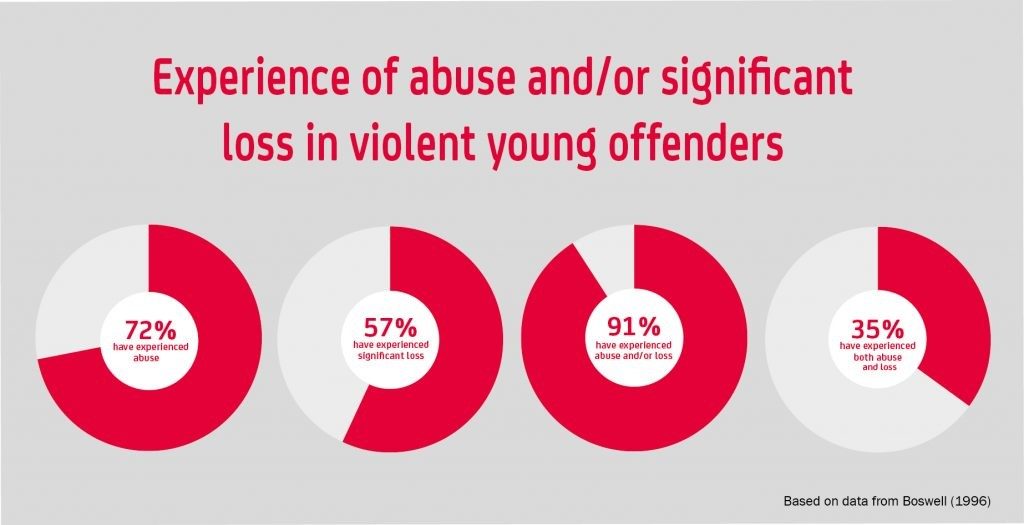28 November 2016 | http://www.beyondyouthcustody.net
A report from Beyond Youth Custody (BYC) states that young people in the criminal justice system have a disproportionate amount of childhood and adolescent trauma – ranging from emotional, physical and sexual abuse, to neglect, bullying, violence, bereavement and abandonment – in their backgrounds, and that this must be identified and responded to effectively.
Previous studies of trauma among groups of young people found that:
- 91% of violent young offenders have experienced abuse or loss
- 40% of female and 25% of male young people in custody have suffered violence at home
- 33% of female offenders have suffered sexual abuse
Research also indicates that offenders are more likely than non-offenders to have suffered adverse effects from traumatic experiences, which appear to be linked to offending behaviour. Trauma can result in inappropriate aggression and is strongly associated with a range of problematic behaviours including violence, antisocial/criminal behaviour, sex offending and substance misuse.
Periods of imprisonment can themselves have a traumatising effect on young people and can also make existing trauma worse.
BYC’s report recommends that organisations across the children and youth justice sectors look at how they can ensure that:
- Trauma and mental health concerns are effectively identified in young offenders at the earliest opportunity, with alternatives to custody being provided where appropriate
- Rehabilitation services include efforts to support young people to develop coping skills and resilience to manage anger and stress
- Services offer trauma-informed wraparound support which acknowledges and pays attention to the trauma that many young people in the system have already experienced or witnessed (and may continue to l experience during custody and after release)
- Increased training for professionals is provided to equip them with the skills to identify trauma in young people, so that appropriate support and guidance can be provided
Pippa Goodfellow, Beyond Youth Custody Programme Manager, says:
“Young people who have experienced trauma need appropriate support to guide them through the criminal justice system in order to address their offending behaviour and change their lives. Only by ensuring trauma is identified and equipping staff to respond effectively can we ensure the system does not compound the impediments to young people’s chances of moving on from crime.
“With appropriate support and guidance young people with some of the most negative stories of childhood and adolescent trauma can be helped access opportunities and to re-shape their futures.”
Trauma and young offenders: a review of the research and practice literature
The report presents key findings from a review of the research and practice literature concerning trauma in the backgrounds of young people who offend. It aims to highlight what is currently known about trauma within the population of young offenders, and to identify the importance of this knowledge for effective resettlement practice. It focuses on:
- Definitions of trauma and the different ways in which trauma has been understood in the research and practice literature
- The prevalence of different types of traumatic childhood and adolescent experiences in the backgrounds of young offenders
- The effects that such trauma can have on young people in the short-term, and its longer-term impacts on emotional, social, and neurological development
- The links between trauma and young people’s behaviour, including the extent of their capacity to comply with youth justice interventions
- The implications that an understanding of trauma and its effects might have for resettlement work undertaken with young custody-leavers. Click here for full report
Young offenders and trauma: experience and impact: a practitioner’s guide
This practitioner briefing aims to highlight what is currently known about the links between trauma and young people’s behaviour and development.
Trauma and its effects are a key consideration for those who work with young offenders. Not only are traumatic experiences very common in the backgrounds of young offenders, but how the impact of these experiences can limit their ability to engage with opportunities in the short term, and in the longer term can seriously narrow their life chances.
It is therefore critical that resettlement practitioners are aware of issues concerning trauma because attempting to address behaviour without understanding a young person’s underlying difficulties can result in unsuccessful and sometimes counterproductive interventions.
This practitioner briefing aims to highlight what is currently known about the links between trauma and young people’s behaviour and development. The next practitioner briefing explores how this insight can begin to inform work with custody leavers. Click here


